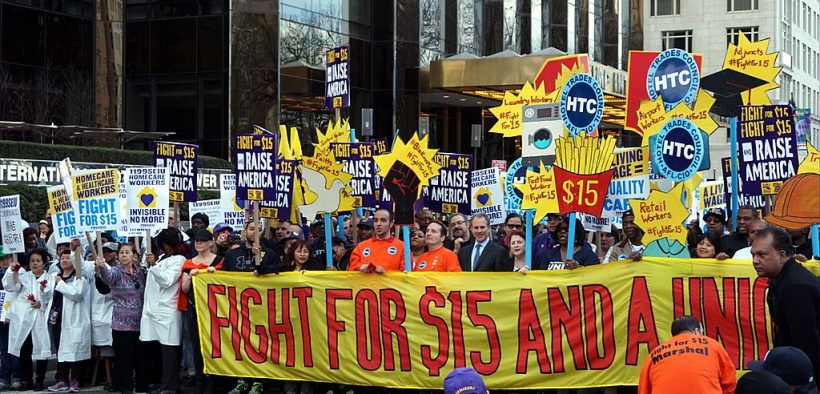House Votes To Increase Minimum Wage

“The real (inflation-adjusted) minimum wage is now roughly 30 percent lower than it was in 1968, and it has been more than 10 years since Congress raised the minimum wage.”
The House voted on Thursday to pass the Raise the Wage Act (RTWA), a bill to increase the federal minimum wage to $15 an hour. While the bill will most likely die in the Republican-led senate, its passage in the House represents a victory for progressive activists.
The bill would incrementally hike the minimum wage to $15 by 2025, and tie further hikes to median wage growth. The gradual, six-year phase-in period is designed to allow for increases to be put on hold if studies reveal the policy has adverse effects on the economy like job losses.
The federal minimum wage has remained at $7.25 for a decade, the longest period without an increase in U.S. history. Proponents of a $15 minimum wage argue a significant boost is warranted to reduce America’s extreme wealth inequality and give low-wage workers basic living standards.
“The real (inflation-adjusted) minimum wage is now roughly 30 percent lower than it was in 1968, and it has been more than 10 years since Congress raised the minimum wage,” according to the Economic Policy Institute (EPI), a leftwing think tank. The EPI argues inflation and growing costs of living (healthcare, housing, education) have made the current minimum wage of $7.25 insufficient to support a decent standard of living.
There is evidence minimum wage hikes kill low productivity jobs, and the bill’s critics argue it could especially hurt tipped workers, who will experience a dramatic wage hike from their current wage floor of $2.13 an hour to $15. Other critics argue it would hurt small businesses.
Senate Majority Leader Mitch McConnell told Fox Business Network that it would “depress the economy at a time of economic boom,” asserting, “we’re not going to be doing that in the Senate.” The White House contended it would “eliminate jobs and reduce total wages for American workers,” and said Trump would veto the bill if it passed in the senate.
The Congressional Budget Office’s (CBO) assessment of the bill shows that it would increase wages for as many as 27.3 million workers, with 1.3 million Americans rising out of poverty as low-income workers see wages increase by a total of $44 billion. However, 1.3 million Americans would lose their jobs under the increase, and business owners would lose $14 billion, according to CBO’s study.
Investigative journalist David Dayen argues the benefits outlined by CBO’s analysis far outweigh the costs, as they represent a wealth-transfer that would dramatically increase quality of life for low-income workers while only subtracting marginal amounts from business owners. Dayen also believes CBO’s analysis is more pessimistic than similar studies, with 29 states and multiple cities finding positive effects after raising their minimum wages in recent years.
The 231-199 vote was largely along partisan lines in the Democrat-led chamber. Six Democrats rejected the measure while three Republicans supported it.
















Reganomics (maintained ever since) = runaway capitalism = increasing obscene wealth disparity. The parasites are killing the host organism.